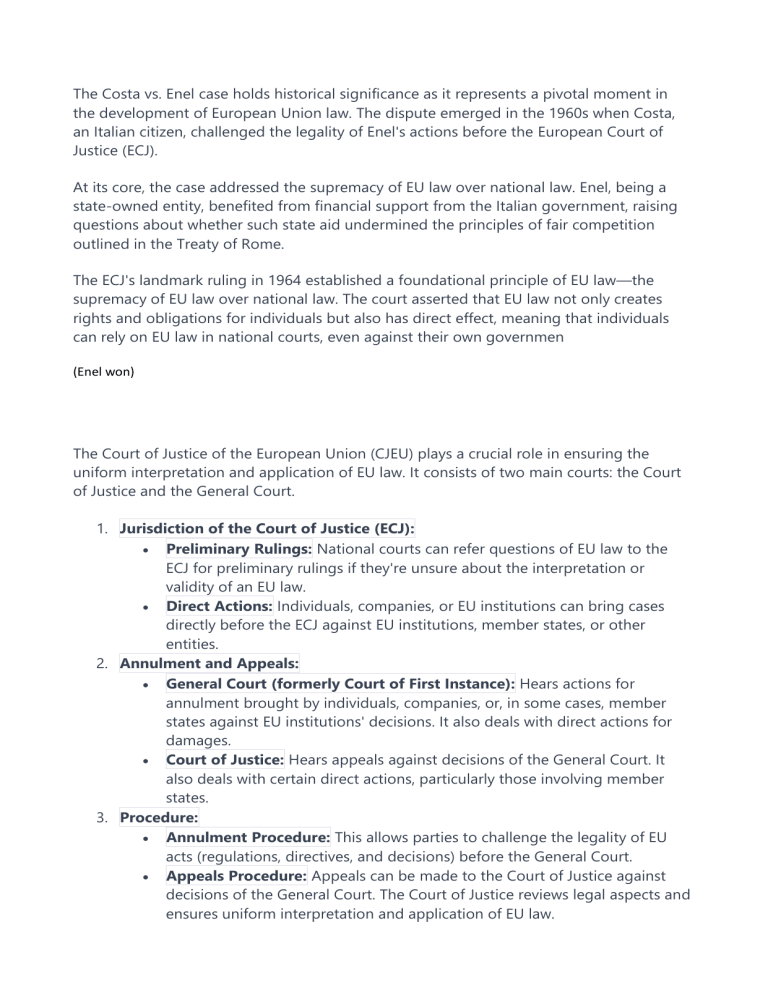
The Costa vs. Enel case holds historical significance as it represents a pivotal moment in the development of European Union law. The dispute emerged in the 1960s when Costa, an Italian citizen, challenged the legality of Enel's actions before the European Court of Justice (ECJ). At its core, the case addressed the supremacy of EU law over national law. Enel, being a state-owned entity, benefited from financial support from the Italian government, raising questions about whether such state aid undermined the principles of fair competition outlined in the Treaty of Rome. The ECJ's landmark ruling in 1964 established a foundational principle of EU law—the supremacy of EU law over national law. The court asserted that EU law not only creates rights and obligations for individuals but also has direct effect, meaning that individuals can rely on EU law in national courts, even against their own governmen (Enel won) The Court of Justice of the European Union (CJEU) plays a crucial role in ensuring the uniform interpretation and application of EU law. It consists of two main courts: the Court of Justice and the General Court. 1. Jurisdiction of the Court of Justice (ECJ): Preliminary Rulings: National courts can refer questions of EU law to the ECJ for preliminary rulings if they're unsure about the interpretation or validity of an EU law. Direct Actions: Individuals, companies, or EU institutions can bring cases directly before the ECJ against EU institutions, member states, or other entities. 2. Annulment and Appeals: General Court (formerly Court of First Instance): Hears actions for annulment brought by individuals, companies, or, in some cases, member states against EU institutions' decisions. It also deals with direct actions for damages. Court of Justice: Hears appeals against decisions of the General Court. It also deals with certain direct actions, particularly those involving member states. 3. Procedure: Annulment Procedure: This allows parties to challenge the legality of EU acts (regulations, directives, and decisions) before the General Court. Appeals Procedure: Appeals can be made to the Court of Justice against decisions of the General Court. The Court of Justice reviews legal aspects and ensures uniform interpretation and application of EU law. 4. Grounds for Annulment: The action must be based on specific grounds, such as a lack of competence, infringement of an essential procedural requirement, or a misuse of powers. The General Court of the European Union plays a crucial role in handling cases related to annulment brought by individuals and undertakings. Here's an overview: 1. Actions for Annulment: Individuals and Undertakings: The General Court allows individuals, companies, and other undertakings to bring actions for annulment against certain decisions of EU institutions, bodies, offices, or agencies. Decisions Subject to Annulment: Decisions subject to annulment include regulations, directives, and decisions that directly affect the individuals or entities bringing the action. 2. Grounds for Annulment: Lack of Competence: The General Court can annul a decision if it finds that the EU institution that adopted it exceeded its powers or acted beyond the scope of its competence. Infringement of Essential Procedural Requirements: If there is a procedural irregularity that significantly affects the decision-making process, the General Court may annul the decision. Misuse of Powers: Annulment is possible if an EU institution uses its powers for purposes other than those for which they were conferred. 3. Review of Facts and Law: The General Court reviews both the facts and the law in cases brought before it. It examines whether the decision was based on a correct interpretation and application of EU law. 4. Actions for Damages: In addition to actions for annulment, the General Court can also hear cases where individuals or undertakings seek compensation for damages resulting from unlawful actions of the EU institutions. 5. Appeals to the Court of Justice: Decisions of the General Court can be appealed to the Court of Justice on points of law. The Court of Justice ensures the consistent interpretation and application of EU law.





